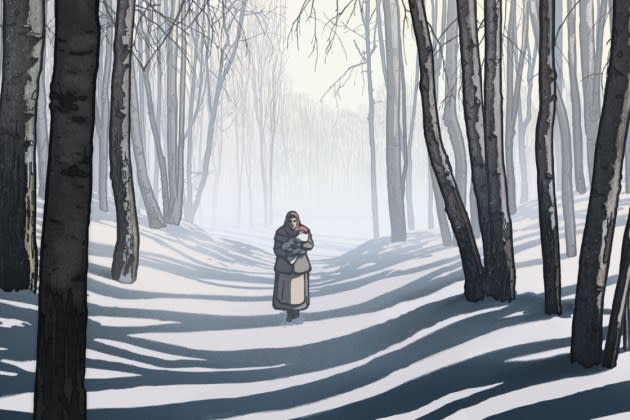‘The Most Precious Of Cargoes’ Review: Michel Hazanavicius’ Animated Holocaust Fable Walks A Fine Line – Cannes Film Festival

If an animated film turns up in the Competition at Cannes, chances are it’s not going to be another Bambi — although, if it were made today, the traumatic shooting of Bambi’s mother would certainly tickle the selection committee. No, Cannes prefers its animation to be skewed towards adults, like René Lalou’s surreal sci-fi Fantastic Planet (1973), Robert Taylor’s raunchy sequel The Nine Lives of Fritz the Cat (1974) or Ari Folman’s wartime docudrama Waltz with Bashir (2008). And with The Most Precious of Cargoes, actor turned director and now graphic artist Michel Hazanavicius has turned to the most controversial topic it is possible to approach with pen and ink: the Holocaust.
Five long years in the making, Hazanavicius’s adaptation of the 2019 novel by Jean-Claude Grumberg arrives in Cannes two years after the death of its narrator, Jean-Louis Trintignant, and, unfortunately, a year after the debut of Jonathan Glazer’s Oscar-winner The Zone of Interest. In terms of technique alone, Glazer’s film is a hard act to follow, and though the two films could not be more different, there are times when those differences raise legitimate questions of taste. Controversy, of course, is nothing new whenever the Holocaust is dramatized — famously, Shoah director Claude Lanzmann even took issue with Steven Spielberg over his handling of the topic in Schindler’s List.
More from Deadline
Michel Hazanavicius Defends Holocaust Animated Film ‘The Most Precious Of Cargoes’ At Cannes
Cannes Film Festival 2024: Read All Of Deadline’s Movie Reviews, Including Palme d’Or Winner ‘Anora’
For the record, Hazanavicius’s film is impeccably sincere in its motives and execution, but the question of showing the unthinkable remains. While being respectful, Hazanavicius steers admirably free of sentiment, and the spare beauty of his visual style is a deliberate irony that will come into play at the very end. Even the narrator is agreed on this point, promising, for the record, that this won’t be a re-run of Little Thumbling (a 17th-century French literary reference that doesn’t translate too well). “I hate that ridiculous fairy tale,” harrumphs Trintignant, in that familiar Gallic growl.
Illustrated crisply and simply, the story opens during a snowy winter in the woods of France, where a poor woodcutter lives with this wife. The rumble of trains fills the air, and the local community knows exactly who’s inside and where they’re being taken: to the concentration camp at Auschwitz. One day, the woodcutter’s wife hears a noise; as one train passes, a baby is thrown into the snow, and she finds it wrapped in blanket, gurgling contentedly. She takes it home, and the woodcutter knows immediately where the infant came from. He wants nothing to do with it, and his threats to get rid of it are chillingly real.
As he knows, Jews aren’t popular with the local community — woodcutters all — who think they are a “heartless” race. “They killed God!” they say. “They are thieves!” The woodcutter believes this too, refusing even to let the child play with his dog, but somehow she gets under his skin. When spring comes round, the woodcutter hears her heartbeat everywhere he goes and starts to argue with the other men of the village as their mob-rule antisemitism reaches a fever pitch. “The heartless have a heart,” he insists, a heresy that will not go unpunished.
Having established the plight of the woodcutter and his wife, the film turns to the baby’s father, showing the desperation that led him to throw his child into the wilderness, and what awaits him at Auschwitz. It’s in these scenes that the film is at its queasiest, chiefly in an uncomfortable montage of grotesque, screaming faces. Glazer used sound exquisitely to convey much better effect, placing Mica Levy’s unsettling score right upfront as a hellish kind of overture. It’s a brief moment, but jarring, and the film wouldn’t lose a beat without it.
At a brisk 81 minutes, it’s all over very quickly, and it’s to Hazanavicius’s credit that he doesn’t equate length with importance: the power of his film derives very much from its clarity and simplicity. It also makes excellent use of animation to translate Grumberg’s post-modern use of the fairy tale into cinema. In the film, as there was in the book, there’s a self-reflexivity there, one that waves the artificiality of its all-too-unlikely scenario in your face: The Most Precious of Cargoes is a friendly reminder that life is not fiction, and that much more important things can happen that are way further beyond belief.
Title: The Most Precious of Cargoes
Festival: Cannes (Competition)
Director-screenwriter: Michel Hazanavicius
Voice cast: Dominique Blanc, Grégory Gadebois, Denis Podalydès, Jean-Louis Trintignant
Distributor: StudioCanal
Running time: 1 hr 21 min
Best of Deadline
Broadway Spring 2024: Sufjan Stevens ‘Illinoise’ & All Of Deadline’s Reviews
Berlin Film Festival 2024: Award Ceremony, Film Premieres & Red Carpet Gallery
Sundance Film Festival 2024 Photos: Award Ceremony, Film Premieres & Parties Gallery
Sign up for Deadline's Newsletter. For the latest news, follow us on Facebook, Twitter, and Instagram.